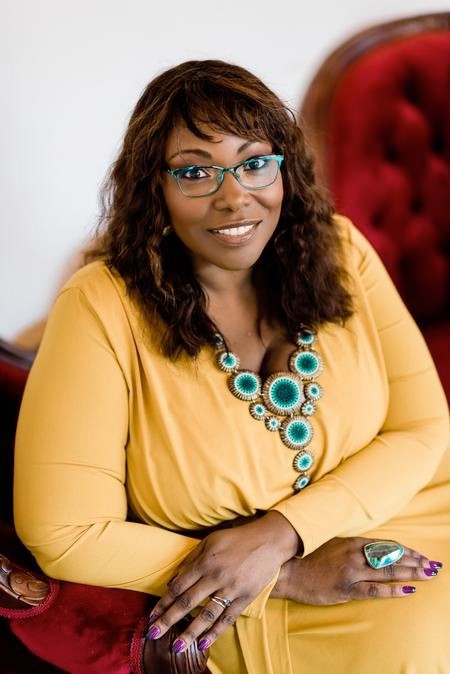2020-2021 Afrofuturism Syllabus - Week 7
Image: Kinitra D. Brooks, Ph.D.
Welcome to Week 7 of the ZORA! Festival 2020-2021 Afrofuturism Course!
Please begin by reviewing About the Course for an introduction and orientation to the 2020-2021 Afrofuturism Syllabus, which bridges the organizing themes of the first two years of the five-year Afrofuturism Conference Cycle: "What is Afrofuturism?" and "What is the Sound of Afrofuturism?"
Note: Each week the course coordinator will release new content related to the conference themes. Content posted here will remain publicly accessible and may be incorporated into other courses, in part or in full, via links to this site. Suggested citation: French, Scot. Syllabus for ZORA! Festival Afrofuturism Course, University of Central Florida, Orlando, Fall 2020-Spring 2021. STARS, https://stars.library.ucf.edu/afrofuturism_syllabus_about/.
Conversations
In the Conversations segment we share resources featuring participants in the 2020-2021 ZORA! Festival Afrofuturism Conference.
This week’s featured Conversation, hosted by the Zora Neale Hurston Festival of the Arts & Humanities, is an is an Afrofuturism and Pop Culture Webinar featuring Kinitra D. Brooks, Ph.D., co-author of The Lemonade Reader: Beyoncé, Black Feminism and Spirituality.
Dr. Brooks is the Audrey and John Leslie Endowed Chair in Literary Studies in the Department of English at Michigan State University and specializes in the study of Black women, genre fiction, and popular culture.
In a ZORA! Festival webinar recorded on November 18, 2020, Dr. Brooks discusses Afrofuturism in popular culture, with a particular focus on HBO’s Lovecraft Country. The conversation is moderated by Trent Tomengo, a Professor of Humanities at Seminole State College. It begins about 8:30 minutes into the video (following a musical intro) and lasts about one hour.
You can find the webinar here.
Explorations
In the Explorations segment we pose a series of questions for further investigation and class discussion, based on the featured Conversation. As you listen to the podcast interview with Dr. Berger, consider the following questions:
- Why is it so important for us to understand what Afrofuturism is, especially in this day and time?
- How are past, present, and future interconnected in Dr. Brooks’s definition of Afrofuturism?
- What makes Afrofuturism "revolutionary" as a way of understanding the world and acting upon it?
- Do the "Blaxploitation" films of the 1970s -- Superfly, Blacula, etc. -- include elements of Afrofuturism?
- Can the creative works of white supremacists, such as the acclaimed horror writer H.P. Lovecraft, inspire Afrofuturist re-imaginings? How does the writer/creator Misha Green invert/subvert the racial anxieties of Lovecraft in her HBO series Lovecraft Country?
- From an Afrofuturist perspective, what makes Misha Green’s Lovecraft Country -- a work of black horror/speculative fiction -- more psychologically satisfying and liberatory than, say, Steve McQueen’s 12 Years a Slave?
- Kinitra D. Brooks, The Safe Negro Guide to HBO's Lovecraft Country, TheRoot.com (2019)
- Blaxploitation films of the 1970s - LibGuide (Dartmouth University Library)
- John Jennings, "Racecraftian Horror" - interview with Eric Molinsky
- Misha Green, HBO's Lovecraft Country - interview with Shondaland
References
Authors, artists, and works referenced in the podcast include:
Next week: An interview with Maurice Broadus, a writer, community organizer, and teacher who uses Afrofuturism in his writing and life. His books include The Knights of Breton Court trilogy, the steampunk novel Pimp My Airship, and the YA detective novel The Usual Suspects.
Resources from 2020
Webinar on Afrofuturism and Pop Culture with Dr. Kinitra Brooks, Kinitra Brooks and Trent Tomengo

